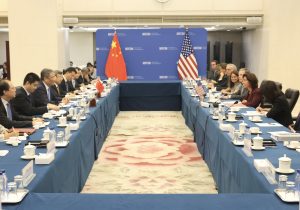U.S. Commerce Secretary Gina Raimondo is visiting Beijing and Shanghai from August 27-30, making her the fourth Cabinet-level official to visit China in a little over two months. During her visit to China, Raimondo will have to consider several profound repercussions for U.S. commercial interests resulting from shifts in Chinese attitudes amid geopolitical tensions.
I have just returned from my own three-week, Chinese university-led factfinding inquiry, including structured workshops to obtain perspectives on China-U.S. trade relations from Chinese experts. In attendance were government representatives, CEOs of both private and public enterprises, and academic and think tank specialists representing various disciplines.
Their insights provide details on Chinese perceptions of the relationship and its impact on global economics. Despite the participants’ differing professional backgrounds, expressions of bitterness toward the United States were heard from every quarter. There was little evidence of trust in the West’s good intentions or in a basis for real partnership.
We asked workshop participants to identify areas of contention in the China-U.S. trade relationship, and to suggest solutions to address challenges and optimize trade relations. The Chinese participants identified 19 areas of contention, such as a U.S. “Cold War” ideology; U.S. interference in Chinese domestic affairs; racialism; and the weaponization of capital. They expressed the belief that the United States is obligated by WTO requirements to provide China access to U.S. technology.
While they acknowledged that both countries stand to gain from improved trade relations, they were unwilling to assign China any responsibility for the current tensions or to offer any solutions. The barriers to cooperation are perceived to be entirely of the United States’ making, and the participants went to great lengths to explain why, in their view, this was so. Overall, the sentiment most frequently voiced was that “the U.S. should reflect on its own wrong perceptions.”
Many of the participants said they seek improved economic ties, but hostile political attitudes were the norm. There were numerous references to the rising East and declining West, a view popularized in recent years by political theorist Wang Huning, currently chairman of the Chinese People’s Political Consultative Conference. Many agreed with the statement that for China to become a high-income nation, the United States must be “brought down” from its top rung.
Much greater emphasis was given toward changing China’s relationship with the U.S. than to the promotion of global growth. There were frequent references to Chinese historical and cultural imperatives that demand China’s return to its ancient and supposedly rightful place in the global hierarchy. In the view of our interlocutors, China’s progress toward advanced developing country status is faltering “because America will not let us do it.”
Participants rarely attributed the structural slowdown of the Chinese economy to poor central strategic decisions that encourage autarky and control data leaving China. Instead, they were certain that China’s economic problems result from deliberate U.S. actions, and their narrative included references to rhetorical and economic aggression.
Curiously, not a single participant brought up Russia’s Ukraine invasion as a contributor to the fraying of China-U.S. economic exchanges.
Chinese public opinion on the Ukraine conflict differs markedly from American perspectives; The belief is widely held that the United States instigated the war by advocating NATO expansion. The notion that China’s support of Russia contributes to Putin’s unwillingness to withdraw to pre-conflict borders fell on deaf ears.
Some spoke of the need for China to step up its efforts at forging partnerships with other developing nations to precipitate an inevitable U.S. collapse. There was wishful thinking that U.S. social justice movements, violent confrontations, and political divisions signal instability in a declining democratic model. Some hoped that the United States would lose ground in technological progress if STEM education and innovation become embroiled in political debates centering on “wokeness.” They asserted that toxic U.S. politics are eroding the foundation of American capitalism. There was scant attention, however, to U.S. fiscal challenges.
Chinese experts seek to exchange ideas in initiatives like this – joint think tanks, seminars, workshops – where experts from both sides can discuss and strategize for mutual benefit. The participants did not offer concrete, actionable solutions for tackling current tensions, but they did respond positively to the suggestion of a bilateral committee to discuss how national security is applied to commerce to avoid useless and harmful procedures.
The sentiments expressed were uniform enough to be both telling and alarming. Yet there were also many instances of cognitive dissonance in which speakers presented contradictory ideas. Precisely these instances pose the highest risks of conflict and mutual escalation, creating a cycle of counterreaction and retaliation.
Here is the broader takeaway: The China-U.S. ideological conflict likely has far more in store for the world economy. The policy challenge is navigating categorical disagreements that extend far beyond governments and large corporations. To do that, we must fully acknowledge these differences. China-U.S. geopolitical dynamics extend far beyond mere economic considerations. How these various dimensions are navigated will shape the nature and scope of future trade agreements.

































